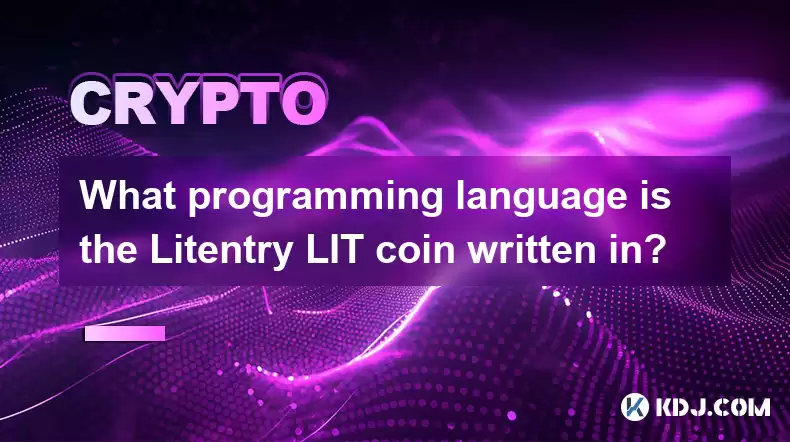-
 Bitcoin
Bitcoin $119100
-0.58% -
 Ethereum
Ethereum $4278
-0.66% -
 XRP
XRP $3.164
-1.81% -
 Tether USDt
Tether USDt $1.000
0.01% -
 BNB
BNB $811.7
0.11% -
 Solana
Solana $176.3
-3.92% -
 USDC
USDC $0.9999
0.01% -
 Dogecoin
Dogecoin $0.2255
-4.43% -
 TRON
TRON $0.3480
2.60% -
 Cardano
Cardano $0.7828
-3.40% -
 Hyperliquid
Hyperliquid $43.59
-4.94% -
 Chainlink
Chainlink $21.34
-3.88% -
 Stellar
Stellar $0.4443
-0.97% -
 Sui
Sui $3.697
-5.60% -
 Bitcoin Cash
Bitcoin Cash $596.5
4.16% -
 Hedera
Hedera $0.2498
-5.10% -
 Ethena USDe
Ethena USDe $1.001
-0.03% -
 Avalanche
Avalanche $23.11
-4.00% -
 Litecoin
Litecoin $121.1
-1.75% -
 Toncoin
Toncoin $3.397
0.42% -
 UNUS SED LEO
UNUS SED LEO $9.002
-1.29% -
 Shiba Inu
Shiba Inu $0.00001307
-4.57% -
 Uniswap
Uniswap $11.20
0.30% -
 Polkadot
Polkadot $3.901
-4.75% -
 Cronos
Cronos $0.1698
3.07% -
 Ethena
Ethena $0.8122
-3.72% -
 Dai
Dai $1.000
0.03% -
 Bitget Token
Bitget Token $4.416
-1.13% -
 Monero
Monero $263.9
-0.82% -
 Pepe
Pepe $0.00001130
-7.37%
What programming language is the Litentry LIT coin written in?
Litentry's reliance on Rust enhances the LIT coin's efficiency, security, and scalability through Rust's performance optimization, strict data handling, and concurrency capabilities.
Jan 01, 2025 at 06:31 am

Key Points:
- Litentry LIT coin is mainly written in Rust,
- Rust is a powerful and secure programming language,
- Litentry leverages Rust's features to enhance the efficiency and security of the LIT coin.
Article Content:
1. Introduction to Litentry and the LIT Coin
Litentry is a decentralized identity network that aims to create a more efficient, secure, and user-friendly identity management system for the blockchain ecosystem. At the heart of Litentry is the LIT coin, a cryptocurrency that fuels the network and incentivizes users to participate in its decentralized identity services.
2. Rust as the Primary Programming Language for LIT Coin
Litentry chose Rust as the primary programming language for the LIT coin due to its combination of efficiency, security, and concurrency features. Rust is a high-performance, systems programming language that offers unparalleled speed and control over memory management. This makes it ideal for developing blockchain-based systems that demand both efficiency and security.
3. Advantages of Using Rust for the LIT Coin
The use of Rust in the development of the LIT coin brings several advantages:
- Enhanced Performance: Rust's optimized memory handling and concurrency features enable the LIT coin to perform faster and more efficiently.
- Increased Security: Rust's strict type system and memory safety checks reduce the risk of bugs and vulnerabilities, enhancing the security of the LIT coin.
- Developer Productivity: Rust's modern syntax and tooling improve developer productivity, making it easier to build and maintain the LIT coin.
4. Rust Features Utilized by Litentry
Litentry leverages various features of Rust to optimize the performance and security of the LIT coin:
- Zero-Cost Abstractions: Rust's zero-cost abstractions enable efficient data structures and algorithms without sacrificing performance.
- Borrow Checker: Rust's borrow checker ensures that memory is managed safely, reducing the risk of memory-related errors.
- Concurrency Model: Rust's concurrency model allows for parallel and asynchronous execution, improving the scalability of the LIT coin.
5. Alternative Programming Languages Used
While Rust is the primary programming language for the LIT coin, Litentry also employs other programming languages for specific components of the network:
- Substrate: Substrate, a framework for building blockchain protocols, is used for developing the core infrastructure of the Litentry network.
- Solidity: Solidity, a contract-oriented programming language, is utilized for writing smart contracts.
- WebAssembly: WebAssembly is employed for developing frontend applications and user interfaces.
FAQs:
- Q: Why did Litentry choose Rust for the LIT coin?
A: Litentry selected Rust due to its unmatched performance, security, and developer productivity. - Q: What are the benefits of Rust for blockchain development?
A: Rust offers efficient memory handling, enhanced security, and improved developer productivity. - Q: What other programming languages are used by Litentry?
A: Litentry also employs Substrate, Solidity, and WebAssembly for various network components and applications.
Disclaimer:info@kdj.com
The information provided is not trading advice. kdj.com does not assume any responsibility for any investments made based on the information provided in this article. Cryptocurrencies are highly volatile and it is highly recommended that you invest with caution after thorough research!
If you believe that the content used on this website infringes your copyright, please contact us immediately (info@kdj.com) and we will delete it promptly.
- BlockDAG, Chainlink, Hedera: The Cryptos Enterprises are Eyeing
- 2025-08-12 09:30:12
- Dogecoin's Wild Ride: Big Holders, Price Push, and What's Next for the Meme Coin
- 2025-08-12 08:30:12
- Coin Master Board Adventure: Free Energy and the Thrill of the Board
- 2025-08-12 08:50:12
- Bitcoin to $133,000? Here's What the Experts Are Saying
- 2025-08-12 08:30:12
- LYNO AI Presale: Early Bird Opportunity Before Token Price Hike
- 2025-08-12 08:50:12
- Dogecoin, Tron Update, Cold Wallet ROI: Navigating Crypto's Choppy Waters
- 2025-08-12 09:30:12
Related knowledge

How to purchase Aragon (ANT)?
Aug 09,2025 at 11:56pm
Understanding Aragon (ANT) and Its PurposeAragon (ANT) is a decentralized governance token that powers the Aragon Network, a platform built on the Eth...

Where to trade Band Protocol (BAND)?
Aug 10,2025 at 11:36pm
Understanding the Role of Private Keys in Cryptocurrency WalletsIn the world of cryptocurrency, a private key is one of the most critical components o...

What is the most secure way to buy Ocean Protocol (OCEAN)?
Aug 10,2025 at 01:01pm
Understanding Ocean Protocol (OCEAN) and Its EcosystemOcean Protocol (OCEAN) is a decentralized data exchange platform built on blockchain technology,...

Where can I buy UMA (UMA)?
Aug 07,2025 at 06:42pm
Understanding UMA and Its Role in Decentralized FinanceUMA (Universal Market Access) is an Ethereum-based decentralized finance (DeFi) protocol design...

How to buy Storj (STORJ) tokens?
Aug 09,2025 at 07:28am
Understanding Storj (STORJ) and Its Role in Decentralized StorageStorj is a decentralized cloud storage platform that leverages blockchain technology ...

Where to find the best price for Audius (AUDIO)?
Aug 11,2025 at 04:01pm
Understanding the Basics of Ethereum StakingEthereum staking refers to the process of locking up ETH tokens to support the security and operations of ...

How to purchase Aragon (ANT)?
Aug 09,2025 at 11:56pm
Understanding Aragon (ANT) and Its PurposeAragon (ANT) is a decentralized governance token that powers the Aragon Network, a platform built on the Eth...

Where to trade Band Protocol (BAND)?
Aug 10,2025 at 11:36pm
Understanding the Role of Private Keys in Cryptocurrency WalletsIn the world of cryptocurrency, a private key is one of the most critical components o...

What is the most secure way to buy Ocean Protocol (OCEAN)?
Aug 10,2025 at 01:01pm
Understanding Ocean Protocol (OCEAN) and Its EcosystemOcean Protocol (OCEAN) is a decentralized data exchange platform built on blockchain technology,...

Where can I buy UMA (UMA)?
Aug 07,2025 at 06:42pm
Understanding UMA and Its Role in Decentralized FinanceUMA (Universal Market Access) is an Ethereum-based decentralized finance (DeFi) protocol design...

How to buy Storj (STORJ) tokens?
Aug 09,2025 at 07:28am
Understanding Storj (STORJ) and Its Role in Decentralized StorageStorj is a decentralized cloud storage platform that leverages blockchain technology ...

Where to find the best price for Audius (AUDIO)?
Aug 11,2025 at 04:01pm
Understanding the Basics of Ethereum StakingEthereum staking refers to the process of locking up ETH tokens to support the security and operations of ...
See all articles

























































































